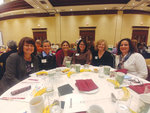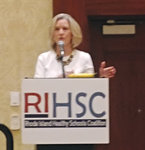By STEPHANIE BERNABA At the end of last school year, fifth-graders at both Rhodes and Garden City elementary schools were on a mission - to reduce waste in their cafeterias. Last April, Matthew Pappas, now a sixth-grader at Western Hills Middle School,
This item is available in full to subscribers.
We have recently launched a new and improved website. To continue reading, you will need to either log into your subscriber account, or purchase a new subscription.
If you are a current print subscriber, you can set up a free website account by clicking here.
Otherwise, click here to view your options for subscribing.
Please log in to continue |
|


At the end of last school year, fifth-graders at both Rhodes and Garden City elementary schools were on a mission – to reduce waste in their cafeterias.
Last April, Matthew Pappas, now a sixth-grader at Western Hills Middle School, led the charge to eliminate waste from Garden City Elementary, and, right on its heels, the entire district.
Armed with a PowerPoint presentation and facts about the harmful effects of plastic straws for humans, animals and the earth, he set out to convince his classmates – and, eventually, the entire district – of the same.
“He did a great job,” said Tricia Wright, general manager of Aramark, who oversees food service for the district. “[It was] pretty eye-opening, the things he came up with, being in fifth grade.”
“Matthew shared his presentation with the entire school, and all the kids jumped on board, so we eliminated straws very easily,” Garden City Principal Brian Byerlee remembered.
Teacher Roderick DaSilva, coordinator of the recycling program at Garden City, explained he supports and encourages students’ ideas for environmental responsibility.
“Anything that’s possible to be recycled, we’re on it,” he said.
DaSilva also explained how the older children at Garden City Elementary have passed along their environmental stewardship to incoming students, and how Pappas lent a helping hand when concerns were raised about younger students’ abilities to open and use containers without straws.
“We sent Matthew and a few of his friends to the kindergarteners and first-graders, and they taught them how to open cartons,” he said. “After a few days, he came back to me and said, ‘They’re fine. They don’t need us anymore.’”
Byerlee was equally impressed with Pappas’ firm commitment to his cause.
“I see him as a leader,” he said. “I see him as someone who, when he sees a problem, wants to help solve it.”
He added: “The kids are leaders. The fifth-graders are leaders, and they take the ball and run with it every year. I’ve seen them step it up even more with our kindergarten students.”
Concurrently, at Rhodes Elementary, a triad of fifth-grade girls were hatching a plan of their own – to reduce both food and plastic waste in their school’s cafeteria.
Mckenzie Rose, Chloe Mercedes and Willa Stefanski, now sixth-graders at Park View Middle School, emailed Wright to request a meeting at their school to discuss their ideas and implementation strategies.
The meeting culminated in the institution of “sharing bins” – soft-sided coolers into which students could deposit unwanted food items purchased at lunchtime for other students to pick up and eat if desired – and the elimination of some single-use plastics.
Wright said that due to food allergies, no home-brought lunch items would be allowed in the bin – only physically stable, individually packaged items could be shared – and whatever food is left at the end of lunchtime goes to the nurses to distribute to students if indicated.
Wright explained that Rhodes became an unofficial pilot for the sharing bin program, and this year it has been instituted district-wide.
The group of young ladies also raised concerns about Styrofoam and single-use plastics in their cafeteria, and shared their presentation in May, helping to garner support for both sharing bins and eventual elimination of these items.
Wright explained that when possible, Styrofoam trays have been replaced with hard plastic ones. She stated that in places where dish machines are available and able to handle large capacities, hard plastic trays have replaced foam. She also stated she is currently working to implement a recycling program for Styrofoam, but due to a more complicated process, more work must be done.
In addition, single use plastic has been eliminated from fruit in the Rhodes cafeteria.
On Oct. 10, the Rhode Island Healthy Schools Coalition highlighted the efforts of the Rhodes students, presenting a video to approximately 300 attendees that outlined the journey of reducing waste in their cafeteria, and later on, the district. The video was produced by two students, Sophie Appel and Jane Kristiansen, both members of Park View Middle School’s media club.
For the 2019-20 school year, the district is a more environmentally and physically healthy one.
Wright described healthy food initiatives such as Eat the Rainbow and programs such as “action stations,” where high school students can watch their own meal be prepared by a chef.
When asked about the state of food service in Cranston, Wright said: “Our numbers have definitely been up.” And she notes a key component to reducing waste has been the initiative of Cranston students.
“Our focus is not to overproduce,” Wright said. Between offering healthy, desirable menu options as well as curtailing waste issues when identified, she is quite pleased with the district’s food service program.
“We’re always willing to do whatever requested – within reason,” she said. “We like that feedback, because they’re the ones who are eating every day and if they’re not choosing what we are serving, then that’s not helpful. We love to help the students and we love to get the students involved.”
Wright was very clear that Aramark welcomes, even encourages, students’ ideas and suggestions across the board.
Keep up with school lunch initiatives at the Cranston Public Schools Foodservice Facebook page.
Comments
No comments on this item Please log in to comment by clicking here